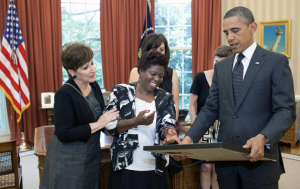By Co-Editor Jess Gallagher
“Nobody’s free until we are all free.”
These are the words of Lois Curtis, the woman whose case determined the most influential court decision for people with disabilities in history. Ms. Curtis served as one of the plaintiffs in the landmark Supreme Court case, Olmstead v. L.C. (1999), which established the right of people with disabilities to live in the least restrictive settings possible under the Americans with Disabilities Act (ADA).
As the Disability Community mourns the loss of one of the nation’s greatest advocates, we reflect on her efforts to achieve justice for all. Her work secured the right of millions of people with disabilities to live within their own communities and away from the forced institutionalization that she faced throughout her life.
Growing up in Atlanta, GA., Ms. Curtis was diagnosed with intellectual and developmental disabilities as a child and, due to a lack of support services for her family, she often wandered away from home. Missing person calls from concerned family members turned to law enforcement officers responding by taking her to jail or a mental institution.
At the age of 11, she was sent to live at Georgia Regional Hospital: a mental institution for people with disabilities. While at the hospital, Ms. Curtis was kept heavily sedated, which was a common practice among institutions. The medications that Ms. Curtis took kept her from living an active life and often drained her of all her energy. After spending two decades of her life in institutions, Ms. Curtis had had enough.
In an interview with Lee Sanders, Ms. Curtis reflected on how she felt right before the Olmstead decision.
“Well, I prayed to God. I cried at night, so I prayed to God every night in my bed. Elaine asked me to pray for her to get out too, so I did.”
After applying for—and being denied—the right to be transferred back to community-based living, the Atlanta Legal Aid Society assisted Ms. Curtis in filing a lawsuit against the state of Georgia, arguing that she and her co-plaintiff, Elaine Wilson, faced discrimination under Section II of the ADA. The Supreme Court ruled in a 6-3 decision in 1999, delivered by Justice Ruth Bader Ginsburg, that Ms. Curtis, Ms. Wilson, and people with disabilities across the United States, have a right to live in less restrictive settings and that undue institutionalization qualifies as discrimination “by reason of…disability.”
For the first time ever, the court had announced that needless institutionalization is, in fact, a form of discrimination. This landmark civil rights case, spearheaded by Ms. Curtis, created a sea of change in how services are now provided for people with disabilities and paved the way for access to integrated employment, housing assistance programs, and counseling services. After the decision, state Medicaid budgets shifted to provide more money to pay for care at home.
Setting a precedent for millions of Americans with disabilities, the Olmstead decision is cited in countless lawsuits that have liberated people with disabilities across the country. And its impact continues to persist—parents now use Olmstead to assert inclusive education practices for children with disabilities and the Obama Administration used its wording to end segregated work programs that used to pay people with disabilities below minimum wage.
The central argument of Olmstead was that if people with disabilities were given the proper support services, resources, and access to care outside of institutions, they could live active and fulfilling lives. Lois Curtis proved this and changed history.
Ms. Curtis moved into her own apartment, worked as a successful artist, and was featured in galleries across Georgia. In 2011, she became a public advocate for the rights of disabled people and presented her artwork to President Obama at the White House, gifting him her painting “Girl in an Orange Dress.”
Ms. Curtis’s bright and boldly colorful pastel and acrylic self-portraits depict her as a young girl, emphasizing that she had no photographs from her childhood due to years living in state psychiatric hospitals—a true reminder of the importance of her activism for the next generation of disabled young people across the U.S.
Ms. Curtis lived her life on her own terms, doing what she loved to do every day. On November 3, 2022, Ms. Curtis died from pancreatic cancer at her home in Clarkson, GA., just outside of Atlanta. She was 55.
As the Disability Community and its allies reflect on the life and legacy of Lois, many have come forward to highlight her work as one of the most influential African-American disability activists. ACL Acting Administrator and Assistant Secretary for Aging, Alison Barkoff, recalls her own experiences with Ms. Curtis, saying:
“Lois Curtis and her steadfast advocacy have profoundly shaped the disability rights movement. Our community has lost one of our heroes. I was lucky to have personally seen what a vital part of her community Lois became, as an advocate, artist, and beloved friend. Let us all carry on her work to ensure the right to community living for all.”
While there is still a long way to go to achieve true disability justice and liberation, Ms. Curtis’s advocacy has fueled not only a movement but a generation. As her legacy continues, we look toward following the leadership of her fellow Black disabled advocates and advocates with intellectual and developmental disabilities. We will honor her work by ensuring everyone has the rights that the Olmstead decision promises them by refusing to accept injustices against people with disabilities.
In the years following the Olmstead decision, Ms. Curtis was asked what she would say to people with disabilities who continue to face institutionalization. Her letter read:
“Hello to all the people living in institutions, I remember you.
Give me a prayer.
Sometimes I feel good about my life.
When I feel bad about my life I name my country, sing the gospel, and bring my mind back home.
I will sing with you again.
Have a beautiful day.
Love,
Lois.”
Cover Image: https://autisticadvocacy.org/2022/11/asan-remembers-lois-curtis/

